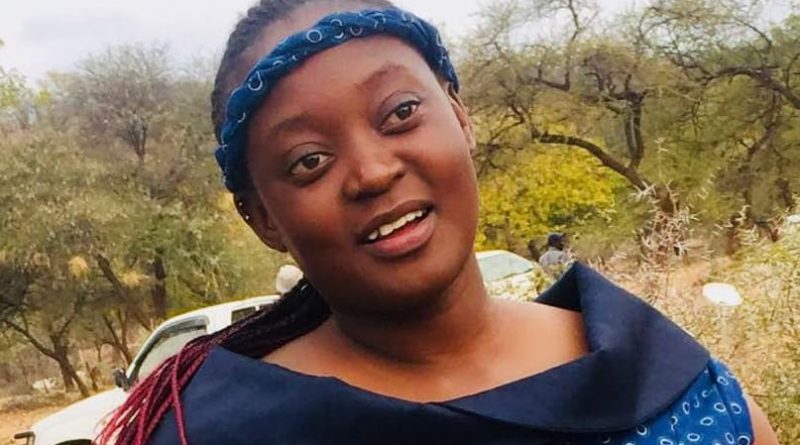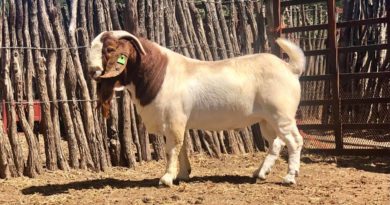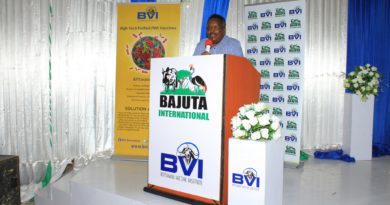Lebogang Mogwera: Aiming for the sky in farming
An accountant by profession, 27 year old Lebogang Mogwera is one of the young females who have not let their white collar jobs stop them from pursuing their first love, farming, reports Kedi van der Westhuizen
Lebogang experienced agriculture on a first hand basis from a very young age. “Every other weekend we will go to the farm and that’s how farming became a part of my life.” She says. However, it wasn’t until 2013 when she started her own farming enterprise, with help from her parents.
The journey so far
Five years down the line, Lebogang is a proud Simmental and boergoat breeder, boasting of a herd of more than 100 goats, 40 cows and a few rabbit does. “My first love was and has always been cattle. But I couldn’t afford them so I started off with goats for cash flow” says Lebo, as she is affectionately called by her friend.
She goes on to explain that she did develop a huge love for small stock as time went by hence she decided to keep them after moving to cattle.
Perfecting her agricultural skills
Lebo believes in education and professional development. She says that modern famers need to be well trained in various aspects of their agribusiness if they are to run their enterprises profitably. This explains why she attended a few judging courses in South Africa through the South African Boer Goat Breeders’ Association. She also attended a short course on sheep and goat production with the Centre for In-Service and Continuing Education (CICE) at Botswana University of Agriculture and Natural Resources (BUAN). “Furthermore, I attended agricultural workshops, field days and did and go on some benchmarking trips in order to acquire the requisite skills.” she elaborates, adding that she continuously learn from other farmers and reads farming magazines and research papers to add onto to her knowledge base.
Juggling farming with other activities
Due to other commitments, Lebo does not stay full time at her farm. She has hired an experienced farm manager who works with experienced farm hands with the same zeal for farming as she does. “I do not live on the farm. I rely heavily on my workers.” Says Lebo. She emphasizes that getting a skilled workers is of paramount importance when it comes to farming. The employees must be able to apply themselves, follow instructions and mostly importantly, keep records accordingly. While she does not stay at the farm fulltime, she is always there on weekends. She says that she is always on standby and ready for calls from the farm at any time of the day.
Surviving against all odds
According to Lebo, her main challenge is not having full control over her operations due to staying hundreds of kilometres away from her farm. Furthermore, cellular network reception is quite low as well which makes talking to the people on the farm a struggle.
“At most, I get to find out about problems in the herd or loss of animals when I make a trip to the farm. Says Lebo.
This disadvantages her as sometimes she loses an animal which she believes could otherwise have been saved had she been present. Market prices are also low, making it difficult for one to break even and see profits. To deal with this situation, farmers are forced to produce in large numbers to get substantial returns which can also create another problem, overstocking, due to lack of land.
Thinking about the future
Despite all the challenges she is facing, Lebo is determined to grow her cattle herd. She also plans to improve the quality of her herd by using Estimated Breeding Values ( EBVs). EBVs are figures that show an estimate of an animal’s genetic merit for a particular trait. “Instead of buying bulls that might just look good due to feed, EBVs will help determine if it is actually of superior quality genetically” Say Lebo. Armed with EBVs, she plans to carefully select superior Simmental bulls for her Artificial Insemination program which she plans to start as soon as she has finished putting all the required infrastructure in place.
As for the goats, she plans to increase her breeding stock to 200. “In that way my operation will generate enough income for me to call the operation “commercial”. I would also like to do a course on artificial insemination in goats and do more judging courses. “It is my wishes to one day become a certified small stock judge,” she adds.
Lebo’s farming plans goes beyond just cattle and goats. She wants to start a commercial rabbit and sheep production operation. After that she will the add poultry. “I am an animal lover in general and would love to have chickens as well as guinea fowls” she says.
Although she sees the agricultural industry as one of the tough businesses one can venture into, she is quick to note that it is a fun filled bumpy ride. “This farming business is not very easy. It is high risk, but with 100% commitment and passion one can get good returns from it,” she notes.
Advice to young farmers
She urges upcoming farmers to start small and expand with time instead of trying to go big all at once. “Start small, grow your herd over time while you learn and gain experience. This way you get minimise the risks.” she says.
The youthful farmer adds that the youth and farmers in general should not lose hope quickly when they need help. They must persevere and continue to knock on doors of relevant authorities to enquire about anything they might need in relation to their agricultural enterprises. She encourages farmers to regularly embark on benchmarking trips both locally and internationally.
Farmers must treat their ventures as businesses and continue to upskill themselves through short courses, workshops and farmers days. Lebo also says that farmers must keep in touch with extension officers in their areas.
As a woman in farming, the highlight of her farming journey has been the unlimited support, encouragement and recognition she gets from her farming counterparts. “I keep a close circle of friends who are always willing to help and uplift me in my farming journey”, She says. She goes on to say that she always feels honoured whenever fellow farmers, male or female, contact her to seek advice as it’s recognition of her and her work as a farmer.
“Don’t be afraid of failure as it is your best teacher. Trust yourself and keep going. Don’t wait for opportunities, go out and look them, if not create them.” she concludes.


